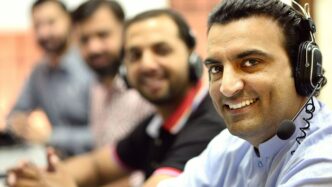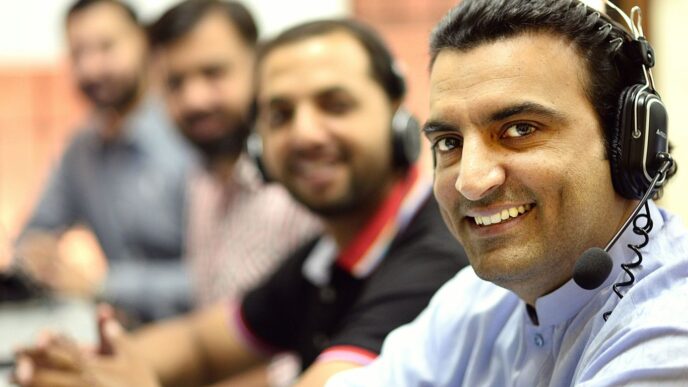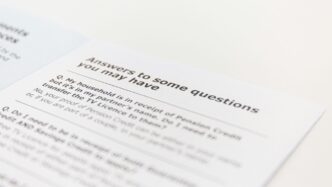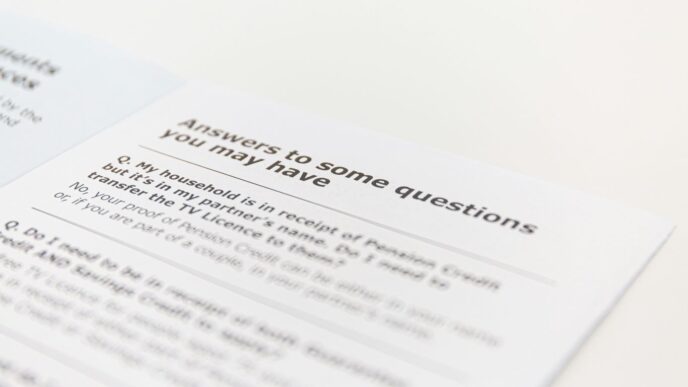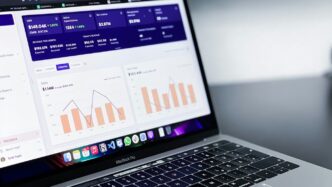Getting ready for a job interview can feel like a lot. You want to make a good impression, show you’re the right person for the job, and basically, not mess it up. It’s not just about what you say, but how you say it, and all the stuff you do before and after the actual chat. Luckily, there are ways to get prepared, and having a solid plan can make a big difference. This guide is here to help you get through it.
Key Takeaways
- A good interview skills PDF acts as your personal guide, helping you organize research and prepare answers.
- Knowing the company inside and out, and matching your skills to the job, is super important.
- Practice makes perfect, especially for common questions and talking about your strengths and weaknesses.
- Using tools like AI or mock interviews can really boost your confidence and performance.
- Don’t forget to ask smart questions and follow up after the interview to show you’re serious.
Mastering Interview Skills With A PDF Guide
So, you’ve got an interview lined up. That’s great! But how do you make sure you’re really ready? A lot of people think a good resume is enough, but honestly, it’s just the first step. To really nail it, you need a solid plan, and a PDF guide can be your secret weapon. Think of it like a personal cheat sheet, packed with all the important stuff you need to remember.
Understanding The Essential Interview Skills PDF
What exactly is this PDF guide we’re talking about? It’s basically a custom document that pulls together all the key details about the company, the job you’re applying for, and how you fit in. It’s not just a random collection of tips; it’s a strategic tool. It helps you keep all your research in one place, match your own skills to what they’re looking for, and get your thoughts straight on common questions. Plus, it helps you come up with smart questions to ask them, showing you’re really interested.
Components Of An Effective Interview Skills PDF
To make sure your PDF guide is actually useful, it should have a few key sections. You’ll want a quick rundown of the company – their main goals, what they’ve been up to lately, and how they stack up against others in their field. Then, break down the job description itself. What are the main tasks? What skills do they really need? And importantly, how do your own experiences line up with all of that?
Don’t forget to include a spot for your own story. This is where you can jot down a quick summary of who you are professionally and what you’re aiming for. Also, list out your biggest wins that show you can do the job. And of course, prepare for those common questions. Think about how you’ll answer things like "Tell me about yourself" or "What are your strengths?" Using the STAR method (Situation, Task, Action, Result) is a good way to structure answers about past experiences.
Here’s a quick look at what to include:
- Company Snapshot: Mission, recent news, industry standing.
- Role Breakdown: Job duties, required skills, your match.
- Your Pitch: Elevator speech, key achievements.
- Question Prep: Common questions and your prepared answers.
- Your Questions: Things you want to ask the interviewer.
- Logistics: Date, time, location, interviewer names.
Benefits Of Utilizing An Interview Skills PDF
Why go through the trouble of making one? Well, it really helps organize your thoughts. Instead of feeling scattered, you have everything laid out neatly. This makes you feel more confident walking into the interview because you’ve done your homework. You’ll be able to give clearer, more focused answers, which always makes a good impression. It shows you’re serious about the opportunity and that you came prepared. It’s a simple way to boost your performance and show professionalism.
Strategic Preparation For Your Next Interview
Getting ready for an interview isn’t just about showing up; it’s about showing up smart. You want to walk in feeling like you’ve got this, not like you’re walking into a surprise quiz. This means doing your homework beforehand. Think of it like prepping for a big game – you wouldn’t just run onto the field without knowing the plays, right?
Consolidating Research For Interview Success
Before you even think about what you’ll say, you need to know who you’re talking to. This means digging into the company. What do they do? What’s their mission? Who are their competitors? Look at their website, read recent news articles, and check out their social media. Understanding the company’s current projects or challenges can give you a real edge. It shows you’re not just looking for any job, but this job. Also, take a good look at the job description again. What are the main responsibilities? What skills are they really looking for? Try to connect your own background directly to these points. The more you know, the more confident you’ll feel answering questions and the better you can tailor your responses.
Highlighting Your Unique Qualifications
Everyone has a resume, but what makes you stand out? It’s not just about listing your past jobs. It’s about telling the story of how your experiences have prepared you for this specific role. Think about specific projects you’ve worked on, problems you’ve solved, or times you’ve gone above and beyond. Use the STAR method (Situation, Task, Action, Result) to structure these stories. This way, you’re not just saying you’re a good problem-solver; you’re showing them how you solved a problem and what the positive outcome was.
Here’s a quick way to think about it:
- Situation: Briefly describe the context.
- Task: Explain what needed to be done.
- Action: Detail the steps you took.
- Result: Share the positive outcome of your actions.
Preparing Thoughtful Responses To Common Questions
There are some questions that almost always come up. Things like "Tell me about yourself," "What are your strengths and weaknesses?" and "Why do you want to work here?" Don’t just wing these. Think about what the interviewer is really asking. For "Tell me about yourself," they want a brief overview of your relevant background and why you’re a good fit. For strengths, pick ones that are directly related to the job. For weaknesses, choose something you’re actively working on improving, and explain how you’re doing it. Having these answers ready, and practicing them out loud, will make a huge difference on the day.
Navigating The Interview Process
So, you’ve prepped your resume, researched the company up and down, and maybe even practiced your handshake in the mirror. Now comes the actual interview. It’s not just about answering questions; it’s a whole experience with different stages and formats you need to be ready for. Think of it like a play – there’s an opening, a middle, and a closing, and you want to nail every act.
Understanding Different Interview Formats
Interviews aren’t one-size-fits-all. They can come at you in a few different ways, and knowing what to expect helps a ton. You might get a quick phone screen first, which is usually just to see if you’re a basic fit. Then there are the classic one-on-one meetings, where it’s just you and the interviewer. Sometimes, you’ll face a panel – that’s a group of interviewers, which can feel a bit intense. And don’t forget group interviews, where you might be asked to discuss something with other candidates. Each type has its own vibe and requires a slightly different approach.
Mastering The Icebreaker And First Impressions
That first minute or two? It’s surprisingly important. It’s where the interviewer gets their initial read on you. A warm greeting, a confident (but not crushing) handshake, and making eye contact are key. Small talk about the weather or how you found the office can help break the tension. Your energy and attitude in these opening moments set the tone for the rest of the conversation. It’s not about being overly chatty, but showing you’re approachable and engaged.
Effectively Addressing Strengths And Weaknesses
This is where you get to shine, but also where you can stumble if you’re not careful. When talking about strengths, don’t just list them; give a quick example of how you’ve used that strength to achieve something. For weaknesses, avoid clichés like "I’m a perfectionist." Instead, pick a genuine area for improvement and, importantly, explain what you’re doing to work on it. It shows self-awareness and a proactive mindset. For instance, if you struggle with public speaking, you might mention you’ve joined a Toastmasters group or taken a course to improve.
Leveraging Resources For Interview Excellence
Getting ready for an interview can feel like a lot, right? Luckily, there are tons of tools and tips out there to help you out. You don’t have to go it alone. Think of these resources as your personal interview coaches, available anytime.
Utilizing AI-Driven Tools For Practice
Artificial intelligence is changing how we prep for interviews. These tools can actually mimic interview situations, letting you practice in a low-pressure way. Whether you’re looking for general questions or ones specific to the job you want, AI can help. Some platforms can even give you instant feedback on your answers, pointing out where you can get better. It’s like having a practice buddy who always knows what to say.
Incorporating Expert Tips And Techniques
Learning from people who have been there can make a big difference. Many resources compile advice from seasoned pros. These guides often show you how to talk about your strengths and weaknesses clearly. They can help you prepare for different kinds of questions, making it easier to talk about your past jobs and your current one without stumbling. For those just starting out, there are specific guides that break down common questions for entry-level roles. The general advice is to really get to know the interview process and practice your answers. People who pay attention to this kind of advice often find it easier to land the jobs they want.
The Power Of Mock Interviews
Practicing is key, and mock interviews are a fantastic way to do it. You can do these with friends, family, or even through online services. The goal is to get comfortable talking about yourself and your experiences in a way that sounds natural, not rehearsed. It helps you find that sweet spot between being well-prepared and being yourself. The more you practice, the less scary the actual interview will feel, and the more confident you’ll be when it’s time to show them who you are.
Demonstrating Your Value In An Interview

So, you’ve prepped, you’ve researched, and now it’s time to show them what you’re made of. This part of the interview is all about making it clear why you’re the person for the job. It’s not just about listing skills; it’s about showing how those skills translate into real results for the company.
Showcasing Leadership and Problem-Solving Abilities
Think about times you’ve taken charge or figured out a tricky situation. Employers really want to see this. It’s not enough to say you’re a leader; you need to tell a story. Use the STAR method (Situation, Task, Action, Result) to lay out a scenario where you stepped up. Maybe you led a project that was falling behind, or perhaps you found a way to fix a recurring issue that was costing the team time. Be specific about your actions and the positive outcomes. Did your leadership help the team meet a deadline? Did your problem-solving save money or improve efficiency? Quantify it if you can. For example, "I noticed our customer response time was slow, so I implemented a new ticketing system that reduced average response time by 20% within a month." That’s a lot more impactful than just saying you’re good at problem-solving.
Crafting Your Personal Brand Story
Everyone has a unique path, and your interview is the place to share yours. What makes you, you? It’s about connecting your past experiences, your skills, and your future goals into a narrative that makes sense for this specific role. Think about the key themes in your career so far. Are you someone who thrives on innovation? Do you excel at building strong relationships? Your personal brand isn’t just a buzzword; it’s how you present yourself consistently. When you talk about your accomplishments, tie them back to this core message. It helps the interviewer see you not just as a collection of skills, but as a well-rounded individual who brings a distinct perspective.
Communicating Your Fit With Confidence
This is where you tie it all together. You’ve shown your skills, you’ve told your story, and now you need to clearly state why you’re a good match for this company and this role. Don’t be shy about it, but also avoid sounding arrogant. It’s about confident self-assurance. Refer back to what you learned during your research about their mission, values, and current challenges. Then, explain how your background and aspirations align with those things. For instance, if the company emphasizes teamwork, talk about your positive experiences collaborating on projects. If they’re looking for someone to drive growth, highlight instances where you’ve successfully initiated new ideas or processes. It’s about showing them you’ve done your homework and that you’re genuinely excited about contributing to their success.
Closing Strong And Following Up
So, you’ve made it through the interview. You’ve talked about your experience, answered those tricky questions, and hopefully, made a good impression. But don’t pack your bags just yet. The interview isn’t truly over until you’ve wrapped things up professionally and followed up afterward. This is your last chance to show your interest and professionalism.
Asking Insightful Questions For The Interviewer
Remember how we talked about preparation? This is where it really pays off. Asking good questions at the end of the interview shows you’ve done your homework and are genuinely thinking about the role and the company. It’s not just about filling silence; it’s about gathering information that helps you decide if this is the right fit for you, too. Think about what you’d want to know if you were taking on this job.
Here are some ideas for questions:
- What does a typical day look like in this role?
- What are the biggest challenges someone in this position might face?
- How does the team usually collaborate on projects?
- What opportunities are there for professional development or learning new skills?
- What are the next steps in the hiring process?
Try to avoid asking about salary or benefits right away, unless the interviewer brings it up. Save those for later in the process.
Concluding The Interview Professionally
When the interviewer asks if you have any final questions, and you’ve asked yours, it’s time to wrap it up. This is your moment to reiterate your interest. A simple, sincere statement can go a long way. You might say something like, "Thank you for your time today. I really enjoyed learning more about this opportunity and I’m even more excited about the possibility of joining your team." A firm handshake (if in person) and maintaining eye contact are good ways to end on a positive note.
The Importance Of Post-Interview Follow-Up
Don’t underestimate the power of a thank-you note. Sending one within 24 hours of the interview is a standard practice for a reason. It’s a polite gesture that keeps you top-of-mind and gives you another chance to highlight why you’re a good candidate. You can send it via email, which is usually the quickest and most common method these days.
Your thank-you note should:
- Thank the interviewer for their time.
- Briefly mention something specific you discussed that interested you.
- Reiterate your enthusiasm for the role and the company.
- Keep it concise and error-free.
For example:
*Subject: Following Up – [Your Name] – [Job Title]
Dear [Interviewer Name],
Thank you so much for taking the time to speak with me yesterday about the [Job Title] position at [Company Name]. I truly enjoyed our conversation and learning more about [mention something specific, e.g., the upcoming project, the team’s approach to X].
Our discussion further confirmed my interest in this role and my belief that my skills in [mention 1-2 key skills] would be a strong asset to your team. I am very enthusiastic about the opportunity to contribute to [Company Name].
Thank you again for your consideration. I look forward to hearing from you regarding the next steps.
Sincerely,
[Your Name]
[Your Phone Number]
[Your Email Address]
[Link to your LinkedIn profile (optional)]
Following up shows you’re serious about the job and have good communication habits. It’s a small step that can make a big difference.
Wrapping It Up
So, we’ve gone over a bunch of stuff about getting ready for interviews. It’s not just about showing up and hoping for the best, right? You really need to do your homework, know the company, and have your own story straight. Using tools like a cheat sheet or even practicing with some AI can make a big difference. It helps you feel more sure of yourself and less like you’re just winging it. Remember, the interview is your chance to show them who you are and why you’re a good fit. Go out there and nail it!
Frequently Asked Questions
What is a job interview cheat sheet?
Think of a job interview cheat sheet like a secret weapon! It’s a special paper you make yourself that has all the important stuff you need to remember for your interview. It helps you keep track of what you know about the company and how your skills fit the job.
Why should I make an interview cheat sheet?
Making a cheat sheet helps you get ready. It’s like studying for a test. When you write down what you need to know, you remember it better. This makes you feel more sure of yourself when you talk to the interviewer.
What kind of things go on an interview cheat sheet?
You can put lots of helpful things on it! Like what the company does, why you want to work there, and examples of when you did a great job. You can also write down questions you want to ask the interviewer.
How do I use the cheat sheet during the interview?
It’s best to look at your cheat sheet before the interview to feel ready. During the interview, you might be able to glance at it quickly if it’s allowed, or just use it to help you remember what you wanted to say.
Can AI help me get ready for interviews?
Yes! There are cool computer programs that can help you practice. They can ask you questions like a real interviewer and even tell you how you did. This is a great way to get better at answering questions.
What’s the STAR method?
The STAR method is a way to tell stories about your past experiences. STAR stands for Situation (what was happening), Task (what you needed to do), Action (what you did), and Result (what happened because of your actions). It helps you give clear and strong answers.









